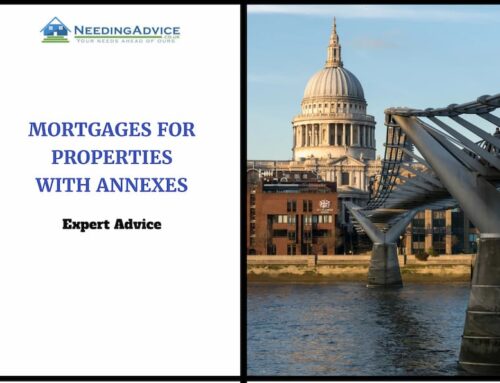Success Stories of Non-EU Applicant Mortgages
Mortgage for Non EU Residents
Considering that there are about 10 million individuals born outside of the UK residing in England and Wales, which constitutes 16.8% of the population, it is surprising that some non-EU citizens may still encounter difficulties in securing a mortgage, either individually or with a partner who is an EU citizen.
At NeedingAdvice.co.uk Ltd, we work with a number of specialist mortgage lenders who offer UK mortgages to foreign non-EU nationals. There are, however, certain things you need to be aware of. In what follows, we will explain both the challenges and potential solutions of getting a mortgage as a non-EU resident.
How can I be eligible to apply for a UK mortgage as a foreign, non-EU applicant?
The first point to be absolutely clear on is that mortgage lenders in the UK make absolutely no distinction whatsoever on the basis of the nationality of the applicant. What they are interested in is trying to ensure that they are not taking unacceptably high risks when they advance large sums to a borrower, whatever the person’s place of birth might have been or their current nationality. However, if you are a non-European applicant, there might some some products you are eligible for, such as tier 2 visa mortgage, skilled worker visa, investor visa, etc.
What checks will a mortgage lender make?
As a non-EU resident, you may not have much credit history in the UK, but you can still get a mortgage approved by a UK mortgage lender.
One of the best ways to do this is to seek help from a non-standard residency mortgage broker. They will be able to assess your finances and credit history, as well as provide tailored advice on how best to go about finding a suitable
There are a number of checks that mortgage lenders will apply in the UK to try and make certain that the risks they are taking are within acceptable parameters. Typically, those checks will include:
- verifying the applicant’s income over time in order to try and ensure that they will be able to afford the repayments against the sum borrowed;
- confirming the identity of the borrower, plus evidence of their stability through having a settled place of residence over time;
- that the person they are looking at has a track record of responsible financial behaviour in terms of servicing their existing debts. This is referred to in the UK as a “credit history check”;
- that there is at least a reasonable prospect of continuity going forward for the individual in terms of their employment and residence in the UK.
If you are looking to start a UK mortgage application as a foreign non-EU applicant. In that case, it is clear that some of the above factors will be difficult to identify and clarify for a potential mortgage lender. For example, if you have arrived from overseas in the relatively recent past, you may have little to offer by way of credit history or continuity of employment and place of residence in the UK.
What evidence will I need to provide as a non–EU mortgage applicant?
When making a mortgage application, you will typically need to provide evidence that you:
- have resided in the UK for at least 24 months;
- work in a permanent job in the UK;
- have a UK-based bank account;
- are able to offer a slightly larger than usual deposit of up to 25% (the deposit is the sum of money you find from your own resources towards the cost of the property).
In a situation where you are unable to show that you have either permanent residency or indefinite leave to remain status, it might still be possible to apply for a mortgage if you’re in possession of one of the following types of visa:
- Tier 1 or Tier 2;
- Family of a Settled Person;
- Residence Card;
- UK Ancestry Visa.
Broadly speaking, lenders will prefer one form or another of permanent residence status, although some may consider applications based upon an ongoing work permit. The above conditions will apply whether or not you are:
- making an application in a sole name;
- applying for a joint mortgage where both parties are non-EU citizens;
- applying for a joint mortgage, where one of the parties is a non-EU citizen.
What documentation will a mortgage lender require?
It is very difficult to say with certainty what paperwork you will need to produce. Each mortgage lender may have their own standards for that and they will be only too happy to share their particular requirements with you. As a general rule though, you should anticipate being asked to produce the following:
- evidence of your identity. As the United Kingdom does not operate an identity card system, this will normally be your passport;
- proof that you are legally resident in the UK. This will entail some of the documents as outlined above;
- a range of documents showing your overall income. That will usually include copies of your past bank statementsA record of a borrower's financial transactions often requir..., evidence of your employment in the form of things such as your employment contract and payslips, P60 benefits statements issued by HMRC and a letter from your employer, etc.;
- documents to indicate your normal outgoings. That would usually be in the form of things such as copies of your recent household bills, bank statements and so on. This is part of a legal requirement placed upon lenders to ensure that the person they are lending to will be able to afford the repayments when taken into consideration against the other regular monthly outgoings. This is sometimes called an “affordability test”.
You will normally pass these documents to a potential specialist mortgage lender, who will then review them. At the end of their checks, if all is well, they may outline that you have a mortgage product in principle. That is essentially a non-committal indication of the sum of money you might be able to borrow in order to purchase a property. At this stage, this is not a formal offer of a mortgage for a non-EU citizen. Once you find a particular property that interests you, you will go back to your potential mortgage lender to make a full formal application. At that time, you may have to submit other documents to them relating to the valuation of the property and so on. It is at that stage that mortgage lenders will consider the totality of your position and if appropriate, offer you a mortgage.
Can I use the Government’s Help to Buy scheme as a Non-EU Resident?
The Government’s scheme is aimed at UK residents, not exclusively British subjects. So you are perfectly at liberty to apply for assistance in this area, though you will also need to meet some of the above-mentioned criteria too. You may need to contact a specialist mortgage broker.
Next steps – Mortgages for a foreign non-EU applicant
There are many variations in the status of individual non-EU citizen applicants. Identifying the best route forward in terms of securing a mortgage can be complicated, and you might benefit from assistance at the earliest stage. Why not contact us for a further discussion?
FAQs: – Mortgages for non-EU residents
How do you build up your credit history to get a non-EU mortgage?
The first thing that needs to happen is that you need to establish an ongoing relationship with a lender who will provide information about your credit rating. This could take several forms, including direct contact via telephone, email or even by post. The key point here is that it’s essential that you keep on top of things so that they know what’s happening with your loan application. In addition, you may need to contact a mortgage broker for bad credit mortgages if you have an adverse credit report.
What are the required criteria for a non-UK citizen to get a mortgage?
The main requirement is that they must have been living in the UK for at least 12 months before applying for their first mortgage. Mortgage Applicants will usually be asked to provide evidence of residencyThe borrower's residency status, such as whether they are a ... such as utility bills showing address details, bank statements etc., as lending criteria. If they don’t meet these requirements, then it may affect how much money they qualify for on loan. For instance, some mainstream banks won’t lend to non-residents unless they live within certain distances of where they work. Therefore, it is always better for a Non Uk Citizen mortgage applicant to contact an expert mortgage broker before starting the application process.
Can I get a mortgage without permanent residency?
You don’t necessarily need to have permanent residence status to apply for a mortgage, although some lenders may require proof of continuous presence in the country. You may need to contact an independent mortgage broker to check your profile as per the mortgage affordability criteria.
Can you get a mortgage if you’re a non-UK citizen and self-employed?
Yes! In fact, many first-time buyers without previous experience of buying a house choose to be self-employed because they believe that being able to demonstrate an income means they won’t need to provide proof of savings. However, this isn’t necessarily true. For example, if, as a non-UK Citizen, you’ve got no other assets apart from your salary, you may not qualify for a loan unless you show evidence of saving money regularly. But there may be some specialist lenders who can accept your loan application after a specific level of deposit.
How are mortgages for tier 1 visa holders assessed?
A Tier 1 visa allows its holder to live and work freely within the United Kingdom without needing to leave the country. This means they don’t need to pay tax when earning money in the UK. The main benefit of having a Tier 1 visa is being allowed to stay indefinitely in the UK. However, there are restrictions on what kind of jobs you can do while holding one. For example, you cannot take part in certain professions such as medicine, law, accountancy and teaching. Most lenders whole assessing your mortgage application as a Tier 1 Visa candidate wants at least 2.5 years left on your visa, although its not always mandatory. To know more about mortgages for non-residents on tier 1 Visa, you can contact any independent mortgage broker such a NeedingAdvice.co.uk Ltd.
Can I get a Buy to Let mortgage on a Visa?
Yes! If you are a non-resident buyer but can prove that you’re eligible for a buy to let mortgage based on your circumstances, there shouldn’t be any reason why you couldn’t qualify for a BTL mortgage. The key thing to remember about buying property using a BTL loan is that you must own the property outright before borrowing against it. You can always contact an expat mortgage broker to get a good deal on your buy to let mortgage.
Can you get a loan on a Tier 2 visa?
Yes! You can get a loan on a tier 2 visa. The main difference between applying for a loan while having a Tier 2 visa compared to other visas is that you need to prove how much money you earn each month. You’ll usually do this through bank statements showing your salary and tax returns. You may still qualify for a higher interest rate, but there could be restrictions on what type of home you buy. Many mortgage providers with similar lending criteria can provide you with the mortgage as non-British residents on skilled workers visas. If you are interested, you can contact expat specialist mortgage broker and start onto a property ladder, generate extra rental income and guard financial ties with the UK.
How to get the UK to buy let mortgage for overseas investment?
Exchange rates shouldn’t be too much of a concern for BTLs (when rental income determines affordability). However, exchange rates can significantly impact your affordability when you’re buying a house as a residential mortgage. It’s better to contact an expat mortgage broker who can help you with different mortgage deals.
Learn more about buy to let mortgages and residential mortgages on our blog.
How much did the invasion of Ukraine impact the mortgage market?
The Russian economy has been hit hard by sanctions imposed by the EU and the US over the annexation of Crimea. As a result, the value of the rouble has fallen sharply against the dollar. This has had a knock-on effect on the price of imported goods, which have become more expensive for Russians. In addition, the cost of living has risen due to increased inflation. These factors mean that many people are struggling to make ends meet. This has led to a rise in unemployment and a fall in consumer spending.
This has also affected the housing market as fewer people are able to afford to buy their first homes. With so few buyers, prices have dropped dramatically. This has caused a shortage of properties available for sale. There are also fewer people looking to rent out their properties because they simply cannot afford to pay the rent being charged.
This means that if you want to invest in the UK property market, you will find it very difficult to find a suitable property at a reasonable price without the help of any market mortgage broker.
Can I get a mortgage for non-EU residents?
Yes, you can get a mortgage as a non-EU resident, but you may need to consider some additional requirements. For example, you might not be allowed to purchase certain types of property or you might be required to show proof of sufficient funds.
You should check whether you are eligible before you apply for a mortgage. To ensure that you don’t miss out on a mortgage deal as a non-British residents, we recommend contacting a specialist mortgage broker who can help you with your mortgage application.
Can I get a non-EUresident mortgage as an ex-pat?
Yes, you can get an ex-pat mortgage on residential and buy-to-let property in the UK. If you’re planning to move abroad permanently, then you should consider getting a mortgage from a mortgage provider who specialises in helping ex-pats. A good mortgage broker will offer tailored advice based on your personal circumstances. They will assess your finances and credit history and advise you on the best way to go about finding your new life abroad.
Can I get a non-EU resident mortgage with a bad credit score?
If you have a poor credit score, it could be harder for you to get a mortgage. You may struggle to prove that you have enough money to cover the repayments. The lender may require you to provide evidence of savings or other assets. Alternatively, they may ask for guarantors or co-signers.
It is important to remember that all lenders have different lending criteria. Before applying for a mortgage, contact a specialist mortgage advisor who will be able to give you a full assessment of your situation.
Can I get a residential mortgage with non-EU resident status?
Yes, you may be able to get a mortgage for buying a house or even a buy-to-let investment property. However, there are restrictions on what type of property you can own. It depends on where you live and the laws in your country. For example, if you are working in the UK, you can apply for a tier 2 worker mortgage to start on the property ladder in the UK. Feel free to contact a mortgage advisor for your international mortgage application.








Leave A Comment